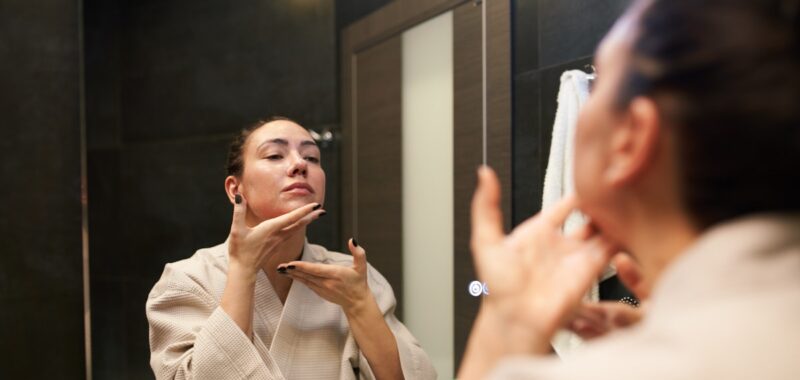It started innocently enough — one random chin hair poking out of my supple 20-year-old skin. I shrieked. It was short and black, like a little spike, and I plucked it immediately. It popped up every now and again — once, unfortunately, it found its way back out of my chin while on a date where my new boyfriend tried to sweep it away thinking it was an eyelash and then had to say, “Oh… no, that’s stuck there” — but for the most part, I didn’t have to think about the intruder. Until I hit my mid-30s and suddenly, chinny chin chin hairs are sprouting all over the place. Actually, I’m assuming this sudden growth of chin and neck hair isn’t as much a sudden growth as it is a sudden color change. Our faces are always covered in hair, but now, those hairs randomly seem to turn black — or sprout new in the middle of the peach fuzz — and I really can’t be the only one. Is this a hormonal issue? Should I get some kind of test done? Is this just what it’s like the closer you get to 40?
I’m all for aging gracefully, but God help me if I ever find myself without my tweezers.
Turns out, age and pre-menopause could be the causes of those spiky little black hairs popping up everywhere. But dermatologist Dr. Jodi LoGerfo says hirsutism — “excessive hair growth in women in areas where men typically grow hair, such as the face, chest, and back” — could also be caused by an imbalance in hormones, particularly androgens (the male hormones). This excess hair growth is often made up of dark, coarse hairs, and can be commonly found on the upper lip, chin, chest, upper and lower abdomen, upper arms, upper and lower back, and inner thighs and buttocks. “Basically in areas where women typically have little or no hair,” LoGerfo says.
Great. So I lost a bunch of hair postpartum and now it’s sprouting up on my face? According to LoGerfo, this excess facial hair growth a pretty common condition in female patients of all ages (but if it’s happening in children, it’s probably just a sign of early puberty). It can just be caused by genetic predisposition (thanks, Grandma), but could also be a sign of a hormonal imbalance or a condition like polycystic ovarian syndrome (PCOS). LoGerfo says PCOS is one of the most common causes of these dark, coarse hairs, but you would also likely be experiencing other symptoms like irregular menstrual cycles, fertility issues, and weight gain along with the hair growth.
“Other potential causes include adrenal gland disorders and certain medications — such as testosterone or dehydroepiandrosterone, or DHEA,” she says. But whether you’re able to pinpoint the reason for the hair growth on your own or not, LoGerfo says that “when a patient presents with hirsutism, we are doing various blood tests to rule out underlying causes and referring for further treatment of those causes if necessary.” It’s definitely worth reaching out to your doctor to see why those dark hairs are popping up. But hirsutism can also occur in some premeonoapusal women and continue well into menopause, LoGerfo says. “This is usually due to a decrease in the amount of estrogen the ovaries are producing while the male hormone production is continuous.”
Once you’ve figured out the cause of those unwanted hairs, removing them is really up to you. LoGerfo shares that waxing is a good option, but you’ll want to use a gentle wax on your face — and waxing is pretty temporary. But, waxing over and over could eventually cause trauma to the hair follicle and stop it from coming back. LoGerfo does recommend avoiding waxing if you’re on a “systemic retinoid like Accutane” as it could cause extreme irritation and injury to your skin.
Laser hair removal is also an option — and a permanent one at that — and is actually most effective when the hair is dark (like the ones sprouting on our chinny chin chins). But threading and chemical depilatories can also be used to get rid of unwanted facial hair. There’s always just shaving if that’s easiest for you, but know that the hair will grow back very quickly.
No matter what, if you’re noticing a lot of new hair growth on your face, mention it to your doctor. They can run blood tests to make sure there aren’t any hormonal issues at play, and a dermatologist can also offer the best ways to remove the hair for your skin type. In the meantime, get you a magnifying mirror and some tweezers. Age ain’t nothing but a number… and a few coarse, black chin hairs.

